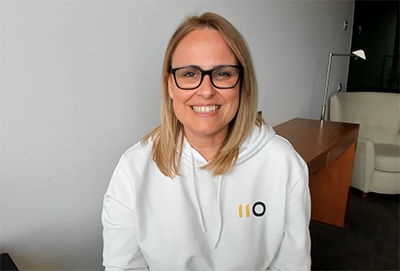

The language of happiness
Choose your words wisely, because they will be decisive in your mood, in your relationships, and even in your happiness. We all carry fears, insecurities, and negativity within us, and language has the power to transform this in our favour.
Language is one more community element, and perhaps the most powerful. It is from speeches that we vote for one political party or another, or that a football team enters the field more or less motivated. From birth, we learn through language, whether spoken, written, or through symbols. And it is these words, to which the community gives meaning, that describe the world around us, and ourselves.
Building a community through language
“Speaking is half his who speaks, and half his who hears.” This is how the philosopher Michel de Montaigne described it. The language we share makes us part of a community, either generically or personalized through slang or words that are only used in our area.
The richer the vocabulary, the easier it will be for society to describe the environment and everything that happens in it. In Galician, for example, there are more than 70 words to describe rain. Thanks to this, this community will have more knowledge in this field for the simple fact that their language has the ability to describe it. A word at a time, we build the environment and our present, but we also build ourselves.
The power of positive language
As the Mexican philosopher Octavio Paz said, we are made of words, and they are our only reality. Therefore, the way we speak will describe this reality, and we can do so in a positive or negative way.
Luis Castellanos is one of the world’s leading figures in positive language. The writer and philosopher has found, after years of research, that positive language directly influences our happiness. The words we choose to describe how we feel, how we see ourselves, or the ones we use to socialize condition our lives.
He argues that all words, positive or negative, have an emotional charge. To get an idea, he theorizes that if we use a negative word when socializing, we must provide five positive words to counteract them and deserve the relationship again. This is the impact of negativity on words.
Building happiness a word at a time
Actions as simple as changing the words we use in our day-to-day life can have a huge impact on our mood and behaviour. Here are some examples:
- Difficult / challenging: changing “it’s hard” to “it’s a challenge” is enough to transform the information we give to the brain. Instead of closing our doors to the positive result, we emphasize that we will work to achieve it.
- I have to do / want to do: it will help us avoid the negative feeling of obligation.
- I’d like to do it, but…: our attention will be focused on everything that comes after the “but”. Let’s change it to an “although”, for example: “I would like to set up my business even though I’m a bit afraid”. This fear is not an impediment, but another challenge.
- Little by little / step by step: for many, “little by little” does not have a negative connotation, but it is true that it expresses slowness and poverty. Changing it to “step by step” involves movement and achieving goals, even if they are small.
- Removing NO from our vocabulary: when say “yes”, we open a whole world of possibilities that “no” closes. Eliminating “no” will also eliminate many frustrations.
- Adjectives: when describing the environment or people, always prioritize positive feedback. Seeing the world with optimism is the best serotonin discharge for your body.
While at first it is a frustrating exercise, as it does not come naturally to us, this practice of transforming language into a more conscious and positive narrative can change our lives. This is the great power of language. And you, do you dare to try it?
Do you want to be the first to receive the latest news about 11Onze? Click here to subscribe to our Telegram channel
If you liked this article, we recommend you read:
 Management
ManagementBusiness management: how can a manager evolve?
5 min readFrom the outside, the manager of a company may appear to be





Molt interessant!!
El llenguatge no verbal es el 80 o 90 %del que es vol trasmetre
Ben cert!
Bons Tips 👍
Gràcies, Josep, per la teva bona valoració!
Molt interessant! 👍👍
Gràcies, Joan, per encoratjar-nos!
Si n’és important el “què”, encara ho és més el “com” 👍
El poder de la paraula… Aquesta mena de comunicació que és un tret exclusiu de l’espècie humana.
La comunicació en diuen els 4rt poder… Però ja ha d’anar dels primers!! I què dir del llenguatge no verbal?? Fets i no paraules…
Molt bon article. En volem més d’aquests d’anàlisi, coneixament intel·ligència emocional…. 👏👏
Moltes gràcies, Laura, pel teu comentari! Ens esperona a continuar i a fer-ho cada cop millor.
Molt ben explicat, de manera clara, concisa i eficient. La frase final l’he sentit sovint, tot i que a l’inrevés “Menys és més”, “Weniger ist mehr” o “Less is more”. Enhorabona!
Moltes gràcies, Jaume! Tens raó, tot i que en aquest cas diem que massa informació no informa, ve a ser el mateix que comentes, menys és més.
👌 Esplèndid. Sense retòrica.
“La paraula és meitat de qui la pronuncia, meitat de quil’escolta.” Fa reflexionar
des d’ un bon començamet. 🙏🏽
Totalment d’acord, Mercè! Fins i tot quan ningú més no ens escolta, actuem de manera dual, tot pronunciant i escoltant alhora. És gairebé màgic.